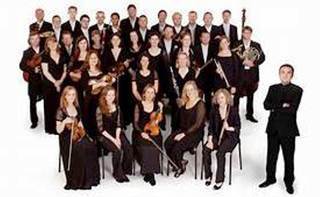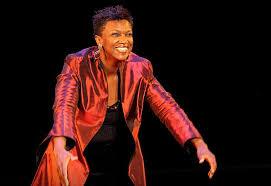|
Back
Widmann’s House of Unending Wonders New York
Zankel Hall, Carnegie Hall
11/19/2019 - & November 16 (Wheaton), 20 (Washington), 2019
Felix Mendelssohn: String Symphony No. 8 in D Major
Jörg Widmann: Versuch über die Fuge (Revised from Fifth String Quartet, New York Premiere) – 180 Beats per Minute
Wolfgang Amadeus Mozart: Adagio and Fugue in C Minor, K. 546
Carl Maria von Weber: Clarinet Quintet, Opus 34 (Revised for clarinet and string orchestra by Irish Chamber Orchestra)
Claron McFadden (Soprano), Daniel Bates (Oboe)
Irish Chamber Orchestra, Jörg Widmann (Principal Conductor and Clarinet) 
J. Widmann and I.C.O. (© Irish Chamber Orchestra)
“The clarinet, though appropriate to the expression the most poetic ideas, is really an epic instrument, the voice of heroic love.”
Hector Berlioz (1803-1869)
“Canon to right of them,/Canon to left of them,/Canon in front of them...”
Lord Alfred Tennyson (1809-1892), Charge of the Light Brigade (revised)
Jörg Widmann suffers the same heaven-sent disease as Esa-Pekka Salonen. Mr. Salonen is one of the world’s most dynamic conductors. And just when an orchestra realizes their great gift, he leaves them and goes onto being one of the world’s most interesting composers. An embarrassment of riches.
Mr. Widmann beats Mr. Salonen by one-third. He is certainly the world’s most wonderful clarinetist (give or take a Finn or two). He is also, with Mr. Salonen, a fascinating and original composer, and this year is the Richard and Barbara Debs Composer’s Chair at Carnegie Hall. To top that off, he has conducted as many orchestras as those with whom he is soloist (no room to list them all).
Last night, he showed us his latest incarnations–as soloist, composer and Principal Conductor and Artistic Partner of the Irish Chamber Orchestra (ICO), a sometimes splendid group of 22 musicians who gave us a bucolic evening.
Even the “sometimes” of this group was not totally negative, thanks to Mr. Widmann.
Felix Mendelssohn’s Eighth String Symphony (written in the composer’s “middle period” at the age of 13) dragged its feet, blurred its sounds for the first two movements, though making up for it with a wonderful country-dance scherzo and finale. Never mind that. This was the first time I had seen Mr. Widmann on the stand, and he is a delight. Graceful, personal, leaning over to the ICO players, he needs no baton for youthful group. Though in the slower sections of the Mendelssohn, and a complex Mozart piece he could have used a shillelagh to get them moving.
Still the late Mozart Adagio and Fugue, was an original work, the result where his study of Bach with his own genius gave some indication how he would have changed the whole history of music had his apartment been better heated and he had lived a few decades more.
Onto the second incarnation of Mr. Widmann, as clarinet soloist. Weber, like Mozart, loved the instrument, and Weber wrote close to a dozen chamber and orchestral pieces for it. The Irish Chamber Orchestra had re-composed Carl Maria von Weber’s Clarinet Quintet for full string orchestra. So either as an ICO gift for Mr. Widmann, or whether it was a natural thing to do, the result was a matter of joy.
Weber’s operas are hardly unknown, but little else is played outside Germany. Mr. Widmann could change that. The one-time Quintet comes nowhere near the soul of Mozart or the breathless autumnal beauty of Brahms. Instead, Weber and Widmann gave us sheer virtuosity, composer for a clarinettist friend who must have been terrific.
For those composers, he might have been more serious. Here, in a work demanding sheer virtuosity, Mr. Widmann let his fingers–and the flawless tonguing and color–do all the work. Whether is be running up or down the scale, whether producing the rare metallic sound in the upper regions, he was like a Big Apple acrobat, so balanced that one could only marvel. Yes, the second movement was like a Bellini aria. But Mr. Widmann played to the ICO, looking at them swaying with the rhythms, having a good time.
Finally, we have Widmann as the composer. His second piece, 180 Beats per Minute, was written when he was a student in Germany. The string quintet buzzed with a single chord, oscillating, buzzing, changing meters and rhythms. The middle sounded far more Slavic or Greek than anything else, but the rest of this five-minute étude was sheer velocity.
Mr. Widmann’s Fifth Quartet with soprano had been re-written for full orchestra (rather, string orchestra with two bassoons), one solo oboe and soprano.
As An Attempt at Fugue, it was 24-minute House of Eccentric Mirrors. The mirrors being fugues, soprano Claron McFadden singing words from Ecclesiastes, and the entire setup based on (what sounded at first like) Bach’s Art of the Fugue. Those who might shrink from almost a half-an-hour of a Baroque structure suddenly sat back to enjoy a show which was quantum-complicated, with dozens of tiny structures all stopped by sudden cadences (like Bach’s work?) and somehow filled with emotional jolts, astounding changes of emotion, counterpoint the instrument bows (waved in the air) creating a stratospheric sound) and of course the work of Ms. McFadden.

C. McFadden
This was not your usual pyrotechnical bouncing from low to high, nor were they the doleful words of the Biblical Book. Yes, Ms. McFadden (with oboe ostinati by David Bates) did survey the whole scale–but each note had its own spectrum of colors, each phrase in and out of harmonies with the Irish Chamber Orchestra.
I would love to say it was a virtuosic performance. But that would be an insult to composer and artists. Attempt at a Fugue was both homage and trickery, a futuristic grid and palette of 18th Century brought up to our own. In effect, it was the entertainment of numbers, endless equations presented like a dazzling cosmic light-show.
Harry Rolnick
|